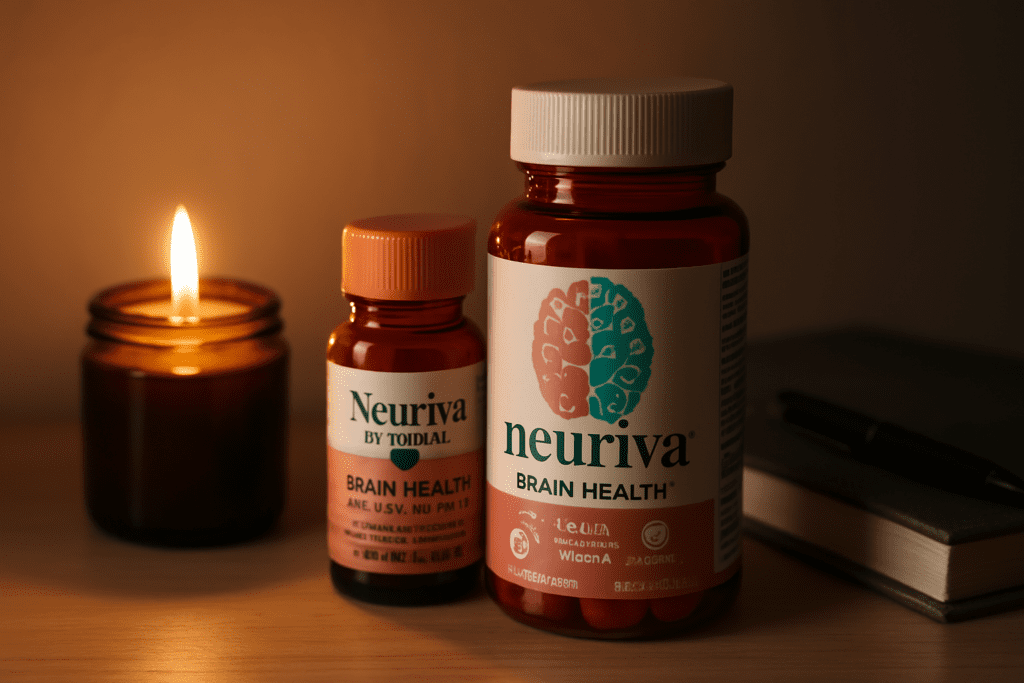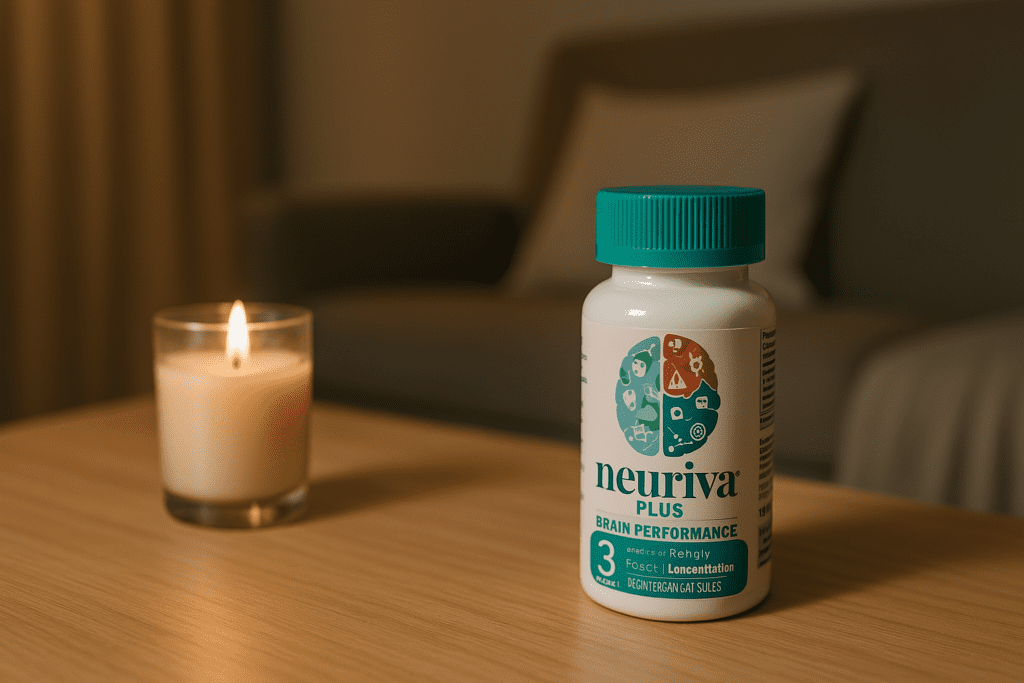In the ever-expanding world of brain health supplements, Neuriva has garnered significant attention from consumers and health enthusiasts alike. Positioned as a nootropic aimed at improving memory, focus, learning, and overall cognitive performance, it raises an important question: Is Neuriva safe for long-term brain health? This inquiry is particularly relevant for those concerned with cognitive longevity and neuroprotection, especially as the demand for evidence-based, safe brain supplements continues to rise. In this article, we explore what the science and user reviews reveal about the effectiveness and side effects of Neuriva, addressing concerns such as “does Neuriva raise blood pressure,” “is Neuriva FDA approved,” and “who should not take Neuriva.”
You may also like: Best Rated Nootropics for Brain Health: Top Supplements to Enhance Focus, Memory, and Longevity
Understanding Neuriva’s Formulation and Intended Benefits
Neuriva is marketed by Schiff Vitamins, a subsidiary of Reckitt Benckiser, and contains two primary active ingredients: Coffee Fruit Extract and Phosphatidylserine. Coffee Fruit Extract is derived from the fruit of the coffee plant and is claimed to increase levels of brain-derived neurotrophic factor (BDNF), a protein that plays a key role in neurogenesis and synaptic plasticity. Phosphatidylserine, on the other hand, is a naturally occurring phospholipid that supports cell membrane integrity and communication in neurons.
These ingredients are designed to support various cognitive functions, including memory, focus, accuracy, learning, and concentration. Given these claims, many users seek to understand how long it takes for Neuriva to work and whether consistent supplementation results in cumulative benefits or potential side effects over time. Neuriva Ultra, a more potent version of the original formula, also includes vitamins B6, B12, and folic acid, as well as the nootropic compound Cognivive, heightening the scrutiny surrounding Neuriva Ultra side effects.
The Neurobiology of BDNF and Its Relevance to Neuriva
One of the most compelling scientific claims supporting Neuriva is that its Coffee Fruit Extract boosts levels of brain-derived neurotrophic factor (BDNF). BDNF is a critical molecule in brain function, supporting the survival of existing neurons and encouraging the growth of new ones. It plays a major role in long-term memory formation, emotional regulation, and synaptic plasticity. Low levels of BDNF have been associated with neurological disorders such as depression, Alzheimer’s disease, and Parkinson’s disease.
However, the connection between supplemental Coffee Fruit Extract and meaningful, sustained increases in BDNF levels remains under scrutiny. Current research suggests that BDNF levels are highly sensitive to multiple lifestyle factors—particularly physical activity, sleep, and dietary diversity. Therefore, even if Neuriva has a modest impact on BDNF, its effect may be overshadowed or enhanced by these external variables. For instance, 30 minutes of aerobic exercise has been shown to increase BDNF levels far more than most supplements. Thus, understanding the context of BDNF in brain longevity highlights that no supplement, including Neuriva, should be viewed in isolation.
Is Neuriva Effective? What the Research Says
Evaluating whether Neuriva is effective requires an analysis of the clinical evidence supporting its ingredients. Although early research into Coffee Fruit Extract shows promise in increasing BDNF levels, the majority of these studies are preliminary, often involving small sample sizes and lacking robust control groups. Moreover, the clinical significance of modest BDNF increases in healthy adults remains unclear. Therefore, when asking “is Neuriva effective,” the answer depends on how one defines effectiveness: biochemical changes versus noticeable cognitive improvements.
Phosphatidylserine has a more established body of research backing its use in cognitive health, particularly in older adults experiencing age-related cognitive decline. Studies suggest that supplementation with phosphatidylserine may support memory and reduce cognitive fatigue. However, it is important to note that many of these studies use higher dosages than what is found in Neuriva. This discrepancy may contribute to the mixed findings in Neuriva brain supplement reviews, where some users report noticeable improvements while others find the product underwhelming.
Does Neuriva Work for Everyone?
The question of “does Neuriva work” cannot be answered uniformly, as individual responses to nootropics vary based on numerous factors such as age, baseline cognitive function, lifestyle, sleep quality, and genetics. For some individuals, Neuriva may serve as a mild cognitive enhancer, especially when paired with other healthy habits like regular exercise and a nutrient-rich diet. Others may find that the product does not meet their expectations, particularly if they are seeking dramatic or immediate results.
Many users also inquire about how long it takes for Neuriva to work. Generally, most supplements targeting brain health take several weeks of consistent use before yielding noticeable benefits. That said, some Neuriva brain health reviews mention experiencing subtle increases in focus or memory retention within the first few days, while others only report results after one to two months of use. As with many nootropics, patience and consistency are key to assessing Neuriva’s efficacy.
What Do Neuriva Brain Health Reviews Reveal?
Consumer feedback provides another valuable lens through which to evaluate Neuriva. Reviews of Neuriva are widely varied, with some users praising its ability to enhance cognitive clarity and memory, while others are skeptical of its impact. Neuriva brain supplement reviews on platforms like Amazon and health forums often highlight subtle benefits, such as increased mental alertness and reduced brain fog, particularly among older adults or those experiencing cognitive fatigue.
However, there are also numerous users who express disappointment, stating that the supplement failed to produce noticeable results. This inconsistency in user experience has led some consumers to explore comparisons, such as “Focus Factor vs. Neuriva,” where cost, ingredient profile, and clinical support are examined side-by-side. Ultimately, the lack of universal efficacy underscores the importance of individualized experimentation when it comes to brain supplements.

Exploring Other Brain Nutrients That Neuriva Does Not Include
Neuriva’s streamlined ingredient profile appeals to users seeking simplicity. However, it omits several well-researched compounds that have demonstrated neuroprotective or cognitive-enhancing effects. Omega-3 fatty acids, for instance, are widely recognized for their role in maintaining neuronal membrane integrity and reducing inflammation. Similarly, adaptogenic herbs such as Rhodiola rosea and Bacopa monnieri have shown promising results in enhancing memory and reducing mental fatigue.
Choline, an essential nutrient for acetylcholine synthesis, is notably absent in Neuriva. This omission may limit its efficacy for those seeking more robust improvements in learning and short-term memory. Additionally, compounds like Lion’s Mane mushroom have gained traction for their potential to stimulate nerve growth factor (NGF), offering a different but complementary route to BDNF-focused strategies. Exploring these alternatives can help users make informed comparisons beyond the common “Focus Factor vs. Neuriva” narrative.
Is Neuriva FDA Approved?
A common question among cautious consumers is whether Neuriva is FDA approved. It is important to clarify that the FDA does not approve dietary supplements for efficacy or safety before they go to market. Instead, it regulates them under the Dietary Supplement Health and Education Act (DSHEA) of 1994. This means that while manufacturers are responsible for ensuring product safety and label accuracy, they are not required to submit products for FDA evaluation unless making specific medical claims.
So, is Neuriva FDA approved? Technically, no dietary supplements—including Neuriva—are FDA approved in the same way pharmaceutical drugs are. However, this does not necessarily imply that Neuriva is unsafe. Rather, it places greater importance on selecting supplements from reputable manufacturers that follow good manufacturing practices and submit their products for third-party testing.
Is Neuriva a Good Fit for Younger Adults?
Most marketing materials and clinical studies around brain supplements focus on older adults concerned with age-related decline. However, younger individuals—particularly college students and professionals—also represent a growing demographic for nootropic use. In this group, the emphasis often shifts from neuroprotection to enhanced productivity and mental stamina.
For younger adults, Neuriva may offer a gentle cognitive boost without the overstimulation of caffeine-based supplements. However, its subtle effects may be less noticeable in individuals who already have high cognitive functioning or who are not experiencing brain fog or fatigue. For this reason, some younger users prefer formulations that include stimulants, adaptogens, or more targeted neurotransmitter support.
Neuriva Side Effects: What You Should Know
The safety profile of Neuriva is generally regarded as favorable, particularly when taken at the recommended dosage. However, as with any supplement, side effects are possible and may vary from person to person. Some of the most commonly reported Neuriva side effects include mild digestive discomfort, restlessness, and headaches. In most cases, these effects are transient and subside as the body adjusts to the supplement.
Neuriva Ultra side effects may be more pronounced for some users due to the additional ingredients, including higher doses of B vitamins and other nootropic compounds. While these nutrients are essential for brain function, excessive intake—especially in individuals who already meet their nutritional needs through diet—may lead to overstimulation or increased anxiety. It’s important for users to monitor their response and discontinue use if adverse effects persist.
Who Should Not Take Neuriva?
Although Neuriva is marketed as a safe brain health supplement for adults, it may not be suitable for everyone. Individuals with a history of hypersensitivity to caffeine-containing products, even trace amounts such as those found in Coffee Fruit Extract, should exercise caution. Likewise, people with underlying health conditions, including anxiety disorders, bipolar disorder, or cardiovascular disease, should consult a healthcare provider before starting any new supplement regimen.
Specifically, the question of “does Neuriva raise blood pressure” is relevant for individuals with hypertension. While Neuriva does not contain traditional stimulants like caffeine, some users have reported experiencing a slight increase in blood pressure or heart rate, particularly with the Ultra formulation. Although these occurrences appear to be rare, they highlight the importance of monitoring one’s physiological response when trying a new supplement. Anyone on prescription medications should also verify potential interactions with a qualified professional before use.
Long-Term Use of Neuriva: Is It Sustainable?
When considering whether Neuriva is safe for long-term brain health, it is essential to weigh the current evidence with practical insights into how brain supplements function over time. Neuriva’s ingredients—particularly phosphatidylserine—have been studied for their long-term safety and efficacy. In these studies, participants who took phosphatidylserine for extended periods showed stable or improved cognitive function without major adverse events.
However, long-term use of any supplement should not be viewed as a substitute for holistic brain health strategies. Neuriva may offer incremental benefits when used consistently, but these should be complemented with a lifestyle that includes regular physical activity, mental stimulation, social engagement, and a nutrient-dense diet. Additionally, users should periodically evaluate whether continued supplementation is necessary or beneficial, ideally under the guidance of a healthcare provider.

Evaluating Cost-to-Benefit Ratio and Consumer Trust
Another dimension worth examining is Neuriva’s cost-to-benefit ratio. With prices averaging between $30 and $50 per bottle depending on the formulation, some users question whether the results justify the investment. When comparing to alternatives like Focus Factor or generic phosphatidylserine supplements, Neuriva may be more expensive per serving, especially considering the relatively limited ingredient profile.
However, Neuriva benefits from strong brand recognition and third-party testing, which can provide a sense of security for first-time users. In contrast, less expensive alternatives may lack transparency or standardized manufacturing. Trust in a brand is an important psychological component, especially for health products consumed regularly. For this reason, Neuriva continues to hold market share despite increasing competition.
Is Neuriva Any Good Compared to Alternatives?
For consumers comparing Neuriva with other cognitive enhancers, the question often arises: Is Neuriva any good when stacked against competing products? Compared to many nootropics that contain synthetic stimulants or racetams, Neuriva offers a relatively gentle, natural approach. This may be appealing for those seeking mild cognitive support without the risk of dependence or overstimulation.
Yet, critics argue that Neuriva’s formula is too simplistic to deliver significant nootropic effects. This sentiment is especially common in the “Focus Factor vs. Neuriva” debate, where users compare comprehensive ingredient lists, pricing, and reported outcomes. Some find that alternatives offer more robust support due to their inclusion of adaptogens, choline sources, or additional antioxidants. That said, Neuriva may still be worthwhile for individuals seeking a minimalist, well-tolerated brain health supplement.
Practical Advice for Incorporating Neuriva into a Brain Health Routine
If you decide to incorporate Neuriva into your wellness routine, consider pairing it with practices that amplify its benefits. For instance, combining Neuriva with daily aerobic exercise can enhance neuroplasticity and blood flow to the brain. Similarly, mindfulness practices like meditation may complement its focus-enhancing effects, while a balanced diet ensures you are not relying solely on a supplement for cognitive nutrition.
Moreover, tracking your mental performance—whether through journaling, digital cognitive tests, or productivity metrics—can help determine whether Neuriva is delivering measurable improvements. Should you experience any negative side effects, such as jitteriness or digestive issues, try reducing the dosage or switching to the original formula if you began with Neuriva Ultra. Ultimately, your personal experience, coupled with guidance from a healthcare provider, will offer the clearest answer to the question: is Neuriva effective for you?
Frequently Asked Questions About Neuriva: Insights Beyond the Label
1. Can Neuriva be taken alongside other nootropic supplements or medications?
Combining Neuriva with other brain supplements or prescription medications requires careful consideration, especially since interactions could alter neurotransmitter balance or exacerbate existing health issues. While Neuriva’s ingredients appear relatively safe individually, stacking it with other nootropics—particularly those that affect acetylcholine levels or include stimulants—can lead to unexpected synergies or conflicts. For instance, excessive phosphatidylserine or B-vitamin intake from multiple sources may increase the risk of overstimulation or headaches. People taking blood pressure medications should also be cautious, as there is still ongoing debate around the question: does Neuriva raise blood pressure in sensitive individuals? Before combining supplements, it’s best to consult a healthcare provider who understands how nootropics interact pharmacologically and can assess your unique health profile.
2. Is Neuriva safe for adolescents or students under 18?
While Neuriva is marketed toward adults, especially older individuals concerned with cognitive decline, its appeal among younger users has been rising. However, the question “is Neuriva safe for teens or adolescents?” is nuanced. There is limited research on the safety and efficacy of nootropics in developing brains, and BDNF manipulation during adolescence could theoretically interfere with natural neurodevelopment. Moreover, ingredients like phosphatidylserine and B6 have different effects depending on age-related metabolism and hormonal regulation. Therefore, even if Neuriva brain supplement reviews seem positive for adults, these cannot be reliably extrapolated to younger users without medical supervision.
3. What are the most commonly underreported Neuriva side effects?
Beyond digestive discomfort and occasional headaches, some users have noted emotional changes or mood fluctuations, especially when taking Neuriva Ultra. These symptoms may relate to alterations in BDNF or phospholipid metabolism, both of which are integral to neural signaling. In rare cases, increased vivid dreaming, insomnia, or agitation may occur—especially when combined with high-stress lifestyles or other supplements. These Neuriva brain health side effects often go underreported because they don’t immediately appear to be linked to the supplement. While the majority find Neuriva well-tolerated, understanding your baseline emotional state and tracking subtle mood changes can provide better insight into how your body is responding.
4. How does Neuriva compare to newer cognitive platforms like Thesis or MindLab Pro?
The rise of personalized nootropics has brought into question whether traditional supplements like Neuriva are still competitive. In terms of ingredient diversity and customization, personalized platforms offer more targeted options, especially for high-performance users. However, Neuriva remains appealing for those looking for simplicity, brand trust, and a milder cognitive aid. Whether Neuriva is any good compared to newer platforms depends on your goals: those needing daily mental clarity without aggressive enhancement may find Neuriva ideal. That said, for individuals with high cognitive demands or a history of experimenting with nootropics, tailored solutions may outperform Neuriva in both subjective and clinical outcomes.
5. What does current research say about the effectiveness of Neuriva’s ingredients over the long term?
Most of the research supporting Neuriva’s key ingredients—phosphatidylserine and Coffee Fruit Extract—suggests their benefits manifest slowly over weeks or months. Studies on phosphatidylserine in aging populations show potential improvements in memory retention and attention span, but consistent use over time is crucial. The timeline for when Neuriva becomes effective is still debated, prompting the question: how long does it take for Neuriva to work? Anecdotal reports vary from several days to over a month. Sustained use combined with lifestyle interventions—such as sleep optimization and regular cognitive activity—may enhance long-term outcomes, particularly in preserving Neuriva memory support benefits.
6. Are there specific populations for whom Neuriva is not recommended?
Understanding who should not take Neuriva is essential for ensuring safe use. Individuals with bipolar disorder or anxiety may find the brain stimulation components too activating, particularly when taking Neuriva Ultra. Similarly, people with existing cardiovascular conditions should monitor blood pressure closely, given isolated reports suggesting Neuriva might raise blood pressure in rare cases. Pregnant and breastfeeding women should also avoid Neuriva, as the effects of BDNF-altering compounds on fetal or infant neurodevelopment are not well-studied. For those with multiple chronic illnesses or who take neurological medications, medical guidance is critical before beginning supplementation.
7. Is Neuriva FDA approved, and does that impact its credibility?
One of the most common misconceptions is the belief that dietary supplements must be FDA approved. In reality, the FDA does not approve supplements like Neuriva for safety or efficacy; instead, it regulates them post-market under the Dietary Supplement Health and Education Act. This leads to the question: is Neuriva FDA approved? The answer is no—but this is standard for most supplements on the market. However, Schiff, the brand behind Neuriva, does follow good manufacturing practices (GMP), and some of their batches undergo third-party testing. While this offers some assurance of quality, the lack of FDA approval should encourage users to be vigilant and informed rather than discouraged entirely.
8. Do Neuriva brain health reviews align with clinical data?
When comparing Neuriva brain health reviews with available clinical evidence, a pattern of moderate satisfaction emerges. Most users report subtle cognitive improvements rather than transformative effects, which aligns with the modest clinical support for its ingredients. However, real-world reviews often reveal aspects not captured in clinical trials, such as improved work focus or reduced mental fog in multitasking environments. Some reviews also highlight frustrations with Neuriva side effects, especially with Neuriva Ultra, suggesting variability in individual tolerance. This divergence between user experience and clinical studies emphasizes the need for personalized trial periods to determine if Neuriva is effective for you.
9. How do user-reported Neuriva Ultra side effects compare with the original formula?
While the original Neuriva formula is generally well tolerated, Neuriva Ultra includes additional ingredients like folate and vitamin B12, which some users report as overly stimulating. Neuriva Ultra side effects are more likely to include jitteriness, elevated heart rate, or gastrointestinal discomfort—especially in users already consuming B vitamins from diet or other supplements. These effects tend to be dose-dependent and may subside over time, but sensitive users often revert to the original version. The enhanced formula may be more effective for people seeking a greater cognitive push, yet it comes with an increased chance of overstimulation. For this reason, trialing both versions separately can help determine the best fit.
10. How does Neuriva compare to Focus Factor in real-world applications?
The ongoing debate—Focus Factor vs. Neuriva—centers on breadth versus simplicity. Focus Factor offers a longer ingredient list, including choline and DMAE, making it potentially better suited for those looking for complex cognitive support. In contrast, Neuriva prioritizes clean-label simplicity and fewer potential interactions. Some users prefer Neuriva because it is less likely to produce unexpected side effects or contraindications. However, others find Focus Factor more effective in boosting multitasking and verbal memory. Ultimately, choosing between them depends on individual health status, cognitive goals, and tolerance to multi-ingredient stacks.

Conclusion: Is Neuriva Safe and Worth It for Brain Longevity?
In conclusion, the question “is Neuriva safe” does not have a one-size-fits-all answer, but the evidence so far suggests that it is generally well tolerated when used as directed. Neuriva side effects are typically mild and uncommon, and for many users, the supplement provides subtle yet meaningful improvements in memory and focus. While questions like “does Neuriva raise blood pressure” and “who should not take Neuriva” are valid, they are best addressed on an individual basis, taking into account personal health history and concurrent medications.
The lack of FDA approval does not automatically undermine Neuriva’s safety, as it adheres to regulatory standards for dietary supplements. However, it emphasizes the need for consumer vigilance, particularly when considering long-term use. As more individuals turn to brain health supplements for cognitive longevity, transparency, efficacy, and individualization will continue to be critical factors in decision-making.
Whether you’re weighing “Focus Factor vs. Neuriva,” exploring Neuriva memory benefits, or scrutinizing Neuriva reviews side effects, it’s clear that the best results come when supplementation is paired with comprehensive lifestyle strategies. In the pursuit of brain longevity and cognitive enhancement, Neuriva may serve as a helpful tool—but not a magic solution. As always, informed choices and evidence-based practices remain your strongest allies on the journey to lasting brain health.
brain boosting supplements, natural nootropics for adults, cognitive support vitamins, BDNF brain health, phosphatidylserine benefits, brain fog remedies, mental clarity supplements, natural focus enhancers, memory improvement strategies, age-related cognitive decline, neuroprotective nutrients, stress and cognitive function, brain wellness support, non-stimulant nootropics, safe memory boosters, brain health stack alternatives, natural brain support for seniors, daily brain health regimen, cognitive longevity tips, brain supplement safety guidelines
Further Reading:
Prevagen vs. Neuriva (I Tried Both For 30 Days): Who Wins In 2025?
The Mental Health Benefits of Phosphatidylserine
Neuriva review – Can its two ingredients boost function?
Disclaimer
The information contained in this article is provided for general informational purposes only and is not intended to serve as medical, legal, or professional advice. While Health11News strives to present accurate, up-to-date, and reliable content, no warranty or guarantee, expressed or implied, is made regarding the completeness, accuracy, or adequacy of the information provided. Readers are strongly advised to seek the guidance of a qualified healthcare provider or other relevant professionals before acting on any information contained in this article. Health11News, its authors, editors, and contributors expressly disclaim any liability for any damages, losses, or consequences arising directly or indirectly from the use, interpretation, or reliance on any information presented herein. The views and opinions expressed in this article are those of the author(s) and do not necessarily reflect the official policies or positions of Health11News.


